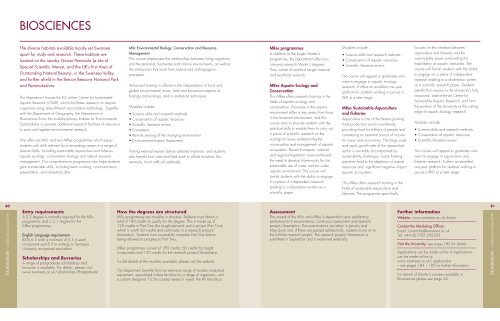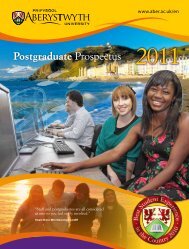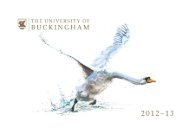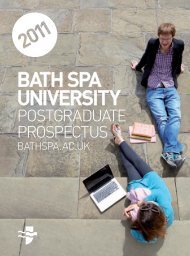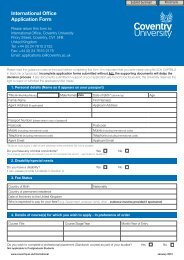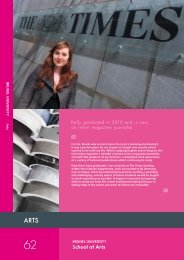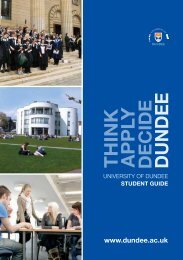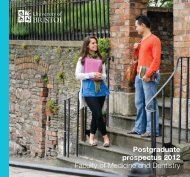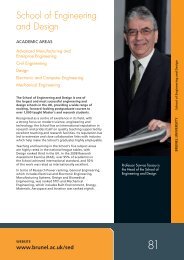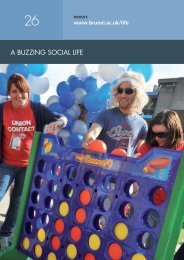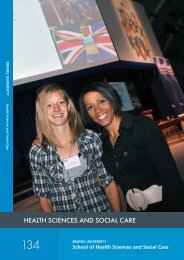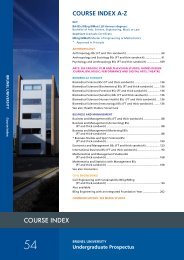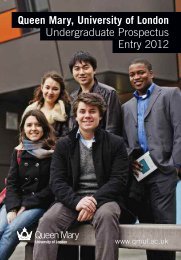www.swansea.ac.uk Postgraduate Prospectus 2012
www.swansea.ac.uk Postgraduate Prospectus 2012
www.swansea.ac.uk Postgraduate Prospectus 2012
- No tags were found...
Create successful ePaper yourself
Turn your PDF publications into a flip-book with our unique Google optimized e-Paper software.
BIOSCIENCESThe diverse habitats available locally set Swanseaapart for study and research. These habitats arelocated on the nearby Gower Peninsula (a site ofSpecial Scientific Interest, and the UK’s first Area ofOutstanding Natural Beauty), in the Swansea Valleyand further afield in the Brecon Be<strong>ac</strong>ons National Parkand Pembrokeshire.The Department houses the £2 million Centre for SustainableAquatic Research (CSAR), which f<strong>ac</strong>ilitates research on aquaticorganisms using state-of-the-art recirculation technology. Togetherwith the Department of Geography, the Department ofBiosciences forms the multidisciplinary Institute for EnvironmentalSustainability to provide additional research f<strong>ac</strong>ilities of relevanceto pure and applied environmental research.We offer one MSc and two MRes programmes which equipstudents with skills relevant for a rewarding career in a range ofdiverse fields, including sustainable aqu<strong>ac</strong>ulture and fisheries,aquatic ecology, conservation biology and natural resourcemanagement. Our comprehensive programme also helps studentsgain transferable skills, including team working, communication,presentation, and analytical skills.MSc Environmental Biology: Conservation and ResourceManagementThis course emphasises the relationships between living organismsand the terrestrial, freshwater and marine environments, as well asthe inter<strong>ac</strong>tions that result from natural and anthropogenicprocesses.Advanced training is offered in the interpretation of local andglobal environmental issues, field and theoretical aspects ofbiology and ecology, and in analytical techniques.Modules include:• Science skills and research methods• Conservation of aquatic resources• Scientific literature review• Ecosystems• Remote sensing of the changing environment• Environmental Imp<strong>ac</strong>t Assessment.Visiting external experts deliver selected materials, and studentsalso benefit from visits and field work to off-site locations (forexample, local artificial wetlands).MRes programmesIn addition to the taught Master’sprogramme, the Department offers twoone-year research Master’s degrees.They consist of one-third taught materialand two-thirds research.MRes Aquatic Ecology andConservationThis MRes offers research training in thefields of aquatic ecology andconservation. Processes in the aquaticenvironment differ in key areas from thosein the terrestrial environment, and thiscourse aims to provide students with thepr<strong>ac</strong>tical skills to enable them to carry outa piece of scientific research on theecological issues underpinning theconservation and management of aquaticecosystems. Recent European, nationaland regional legislation have reinforcedthe need to develop frameworks for thesustainable use of water and the wideraquatic environment. The course willfurnish students with the ability to engagein a piece of independent researchleading to a dissertation written as ascientific paper.Modules include:• Science skills and research methods• Conservation of aquatic resources• Scientific literature review.The course will appeal to graduates whowant to engage in aquatic ecologyresearch. It offers an excellent one yearplatform for students wishing to pursue aPhD at a later stage.MRes Sustainable Aqu<strong>ac</strong>ultureand FisheriesAqu<strong>ac</strong>ulture is one of the fastest growingfood production sectors worldwide,providing food for millions of people andconstituting an essential source of incomefor many rural economies. The large scaleand rapid growth rate of the aqu<strong>ac</strong>ulturesector is inevitably <strong>ac</strong>companied bysustainability challenges. Some farmingpr<strong>ac</strong>tices lead to the depletion of naturalresources and, significant negative imp<strong>ac</strong>taquatic ecosystems.This MRes offers research training in thefields of sustainable aqu<strong>ac</strong>ulture andfisheries. The programme specificallyfocuses on the interf<strong>ac</strong>e betweenaqu<strong>ac</strong>ulture and fisheries and thesustainability issues surrounding theexploitation of aquatic resources. Thecourse will furnish students with the abilityto engage on a piece of independentresearch leading to a dissertation writtenas a scientific research paper. Studentsbenefit from <strong>ac</strong>cess to the University's fullyresourced, state-of-the-art Centre forSustainable Aquatic Research, and fromthe position of the University at the cuttingedge of aquatic biology research.Modules include:• Science skills and research methods• Conservation of aquatic resources• Scientific literature review.This course will appeal to graduates whowant to engage in aqu<strong>ac</strong>ulture andfisheries research. It offers an excellentone-year platform for students wishing topursue a PhD at a later stage.8081MASTER'S DEGREES – BIOSCIENCESEntry requirementsA 2.2 degree is normally required for the MScprogramme, and a 2.1 degree for theMRes programmes.English Language requirement:IELTS 6.5 (with a minimum of 5.5 in e<strong>ac</strong>hcomponent and 6.5 in writing) or SwanseaUniversity recognised equivalent.Scholarships and BursariesA range of postgraduate scholarships andbursaries is available. For details, please visit:<strong>www</strong>.<strong>swansea</strong>.<strong>ac</strong>.<strong>uk</strong>/scholarships/<strong>Postgraduate</strong>How the degrees are structuredMSc programmes are modular in structure. Students must obtain atotal of 180 credits to qualify for the degree. This is made up of120 credits in Part One (the taught element) and a project (Part Two)which is worth 60 credits and culminates in a research project/dissertation. Students must successfully complete Part One beforebeing allowed to progress to Part Two.MRes programmes consist of 180 credits: 60 credits for taughtcomponents and 120 credits for the research project/dissertation.For full details of the modules available, please visit the website.The Department benefits from an extensive range of modern analyticalequipment, specialised culture f<strong>ac</strong>ilities for a range of organisms, anda custom designed 12.5m coastal research vessel, the RV Noctiluca.AssessmentThe award of the MSc and MRes is dependent upon satisf<strong>ac</strong>toryperformance in examinations, continuous assessment and researchproject/dissertation. The examinations are taken in January andMay/June and, if these are passed satisf<strong>ac</strong>torily, students move on tothe full-time research project. The research project/dissertation issubmitted in September and is examined externally.Further informationWebsite: <strong>www</strong>.<strong>swansea</strong>.<strong>ac</strong>.<strong>uk</strong>/biosciCont<strong>ac</strong>t the Marketing Officer:Email: s.kramcha@<strong>swansea</strong>.<strong>ac</strong>.<strong>uk</strong>Tel: +44 (0)1792 295333Visit the University: see page 182 for detailsApplications can be made online at Applicationscan be made online at:<strong>www</strong>.<strong>swansea</strong>.<strong>ac</strong>.<strong>uk</strong>/ applyonline– see pages 184 – 185 for further informationFor details of Master’s courses available inBiosciences please see page 24.MASTER'S DEGREES – BIOSCIENCES


